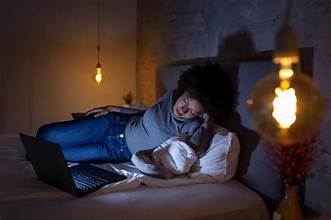Digital detox lifestyle for better sleep sets the stage for this enthralling narrative, offering readers a glimpse into a story that is rich in detail with casual formal language style and brimming with originality from the outset.
This guide delves into the impact of digital devices on sleep quality, strategies for incorporating digital detox into daily routines, and the benefits of embracing a screen-free lifestyle for improved sleep.
What is a digital detox lifestyle?
A digital detox lifestyle refers to intentionally reducing or eliminating the use of digital devices such as smartphones, computers, and tablets to prioritize mental and physical well-being. This practice allows individuals to disconnect from constant screen time and focus on real-life interactions and activities. By embracing a digital detox lifestyle, individuals can experience various benefits, including improved sleep quality, reduced stress levels, enhanced focus and productivity, and better overall mental health. Disconnecting from digital devices can also lead to increased mindfulness, better relationships, and a healthier work-life balance.Activities for Better Sleep
- Reading a physical book before bedtime instead of scrolling through a device screen can help relax the mind and promote better sleep quality.
- Engaging in relaxing activities such as meditation, yoga, or deep breathing exercises can calm the body and mind, preparing them for a restful night's sleep.
- Creating a bedtime routine that does not involve digital devices, such as listening to calming music or taking a warm bath, can signal to the brain that it is time to wind down and sleep.
Importance of Unplugging
Unplugging from digital devices is crucial for improved well-being as it allows individuals to reduce exposure to blue light, which can disrupt the body's natural sleep-wake cycle. Constant use of digital devices before bedtime can lead to difficulty falling asleep, poor sleep quality, and increased risk of sleep disorders.Effects of digital devices on sleep quality
Excessive use of digital devices before bedtime can have a significant impact on the quality of sleep. The blue light emitted by screens, such as smartphones, tablets, and computers, can disrupt the body's natural sleep-wake cycle, also known as the circadian rhythm. This disruption can lead to difficulty falling asleep, staying asleep, and getting restful sleep, ultimately resulting in insomnia.Exposure to screens before bed
- Using digital devices before bed stimulates the brain, making it harder to wind down and fall asleep.
- The content viewed on screens can be mentally stimulating or stressful, further delaying the onset of sleep.
Impact of blue light on circadian rhythm
- Blue light suppresses the production of melatonin, a hormone that regulates sleep.
- Exposure to blue light in the evening can trick the brain into thinking it's daytime, disrupting the body's natural sleep signals.
Correlation between screen time and insomnia
- Research has shown a direct link between excessive screen time before bed and the development of insomnia.
- Prolonged exposure to screens can lead to a delay in the sleep onset, reduced total sleep time, and poor sleep quality.
Strategies for incorporating digital detox into daily routine
To successfully incorporate a digital detox into your daily routine, it is essential to design a schedule that includes designated screen-free times, organize alternative activities to replace screen time before sleep, and create a bedtime routine that promotes relaxation without digital devices.Design a Daily Schedule with Screen-Free Times
- Set specific times during the day where you will avoid using any digital devices.
- Use this time for activities such as reading, exercising, or spending time outdoors.
- Establish boundaries with work-related screens, ensuring they are turned off during personal screen-free times.
Organize Alternative Activities Before Sleep
- Create a list of relaxing activities to do before bedtime that do not involve screens, such as reading a book, meditating, or taking a warm bath.
- Avoid screen time at least an hour before bed to allow your mind to unwind and prepare for sleep.
- Engage in calming activities that promote restful sleep and relaxation.
Create a Bedtime Routine without Digital Devices
- Establish a bedtime routine that includes activities like stretching, deep breathing exercises, or journaling.
- Avoid using digital devices in bed and replace them with calming rituals that signal to your body that it's time to wind down.
- Invest in an alarm clock instead of using your phone as an alarm to reduce the temptation of checking screens before sleep.
Benefits of digital detox on sleep
Reducing screen time through a digital detox can have numerous positive effects on overall sleep quality. By disconnecting from digital devices, individuals allow their minds to unwind and relax, leading to better sleep patterns and improved restfulness.Enhanced Sleep Quality
- Reducing exposure to blue light emitted by screens can help regulate the production of melatonin, the hormone responsible for sleep.
- Improved sleep hygiene from disconnecting before bedtime can lead to deeper and more restorative sleep cycles.
- Decreased disruptions during the night, such as notifications or alerts, can result in uninterrupted sleep and better sleep continuity.
Personal Experiences
"After implementing a digital detox routine, I noticed a significant improvement in my sleep quality. I fell asleep faster, stayed asleep throughout the night, and woke up feeling more refreshed and energized."
Enhanced Productivity and Mental Health
- Quality sleep from a digital detox can enhance cognitive function, memory retention, and overall productivity levels during the day.
- Reduced screen time can lower stress levels, improve mood, and contribute to better mental well-being.
- Overall, better sleep quality from a digital detox lifestyle can lead to a more balanced and healthier lifestyle, promoting both physical and mental wellness.










